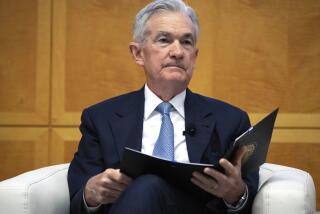Japan Says It Won’t Hike Interest Rates : Financial Officials Declare They Will Not Match West Germany’s Surprise Increase
TOKYO — Japanese officials today quashed speculation that Japan will match West Germany’s surprise increase in interest rates, easing anxieties of a global interest rate spiral.
“Japan has no plan to change its monetary policy now,” Finance Minister Tatsuo Murayama told reporters.
Rumors abounded that the Bank of Japan would soon raise its discount rate--what it charges commercial banks for loans--after West Germany’s central bank unexpectedly raised key interest rates by a half-point Thursday.
Belgium’s central bank raised interest on five key lending rates today, but no other country followed suit.
The Japanese Finance Ministry’s stance on the discount rate is crucial because the Bank of Japan needs the ministry’s tacit support before it can act.
Some traders had speculated that the Japanese central bank might use its quarterly meeting of regional managers next week as an opportunity to raise the discount rate. Although the regional managers themselves do not set monetary policy, their reports on the state of Japan’s economy carry weight with policy-makers at the bank.
But a senior Finance Ministry official vehemently denied that rates would be raised next week. “I would totally deny the market speculation the Bank of Japan will change its policy next week, or in the very near future,” he said in an interview.
Pressure Acknowledged
The senior Finance Ministry official acknowledged that some officials at the Bank of Japan want to raise the discount rate as soon as possible. But, he added, “They need much more justification for doing something at the moment.”
In West Germany, the Bundesbank boosted rates to ward off inflation by slowing monetary growth. The increases sent a distress signal throughout the world, hammering stock prices in London, New York, Paris and Toronto.
But Japanese prices are stable, Murayama countered, although he said future trends should be watched due to rising oil prices and the uncertain outlook for domestic labor costs.
The annual wage round, recently ended, produced an average pay raise of just over 5%, the largest in years but below the level feared by some Japanese monetary officials.
But some economists are betting that the central bank will get the justification it needs for action from consumer and wholesale price statistics to be released over the next few months.
The statistics, starting with consumer price data to be released next week, are expected to show a pick-up in inflation after the April 1 introduction of a 3% sales tax.
The Bank of Japan’s discount rate has remained at a record low of 2.5% for more than two years, and the country’s markets were calmed by Murayama’s assurances.
After tumbling more than 400 points in early trading, Tokyo stocks later recouped much of their losses. The key 225-share Nikkei index closed down 155.34 points at 33,029.81, ending the week with a 120.63-point loss.
More to Read
Sign up for Essential California
The most important California stories and recommendations in your inbox every morning.
You may occasionally receive promotional content from the Los Angeles Times.










